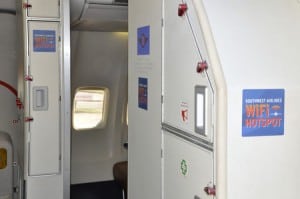Latest News
[Via Satellite 09-04-2014] In-Flight Entertainment (IFE) services provider Global Eagle Entertainment is looking heavily at opportunities for new In-Flight Connectivity (IFC) customers outside of the United States. Speaking at the Citi 2014 Global Technology Conference, Global Eagle CEO Dave Davis told investors that the IFC component of the company’s business is growing faster than the rest, and that international markets will be a top focus.
“If you look at the penetration of worldwide airline fleets with some sort of connectivity onboard today, internationally less than 6 percent of the aircraft flying have some form of connectivity. In the U.S. that’s north of 50 percent,” said Davis.
According to Davis, Global Eagle controls 60 to 70 percent of the content delivery market. The company provides hardware-agnostic embedded systems, and has begun offering wireless non-Internet based entertainment distributed from onboard planes. But this unconnected service is new, he said, whereas IFC is seeing market growth of up to 30 percent a year.
“We have the largest fleet of satellite-based connectivity systems installed today; about 570 aircraft are flying around the world with our satellite based system installed. The market is growing very rapidly. The U.S. is largely built out but internationally this is a wide open business,” he said.
Global Eagle provides IFC globally through Ku-band satellites. Davis expressed confidence that satellite would be the company’s long-term strategy, showing little interest in Air-to-Ground (ATG) networks, since they cannot connect aircraft as they fly across oceans. Furthermore, satellites can provide higher bandwidth speeds and bypass the regulatory steps needed to install large terrestrial systems. “The game internationally is satellite based,” said Davis.
The global market for IFC has grown more appealing for other providers as well. Gogo has set its sight on international markets, as the company shifts to lean more heavily on satellite than ATG. Panasonic Avionics too, is looking worldwide, having signed for a dedicated IFC payload over the Asia-Pacific region on Eutelsat’s upcoming satellite Eutelsat 172b.
Global Eagle’s largest IFC customer is Southwest Airlines, with roughly 450 connected aircraft, according to Davis. Norwegian Air Shuttle is the company’s largest European customer, with 70 connected aircraft today and many more on order. Davis said two Russian airlines have signed up for IFC, as well as other international airlines such as Icelandair, Air China and South Africa-based Mango Airlines.
In Thailand, Global Eagle has partnered with Nok Air and Thaicom to provide connectivity this year. Davis said the partnership will be a major strategy going forward. He admitted that it makes sense for telcos to offer IFC, but said it is a challenging market to enter domestically because most contracts are long term, often reaching out to 2018 or 2020. Davis expects more future contracts to mimic the model laid out between Global Eagle, Thaicom and Nok Air.
He also hinted that partnerships would be used to evaluate new frequencies beyond Ku-band. “We are exploring a Ka offering as well,” he said. “If we did something in the Ka world, it would be with a partner.”
Get the latest Via Satellite news!
Subscribe Now